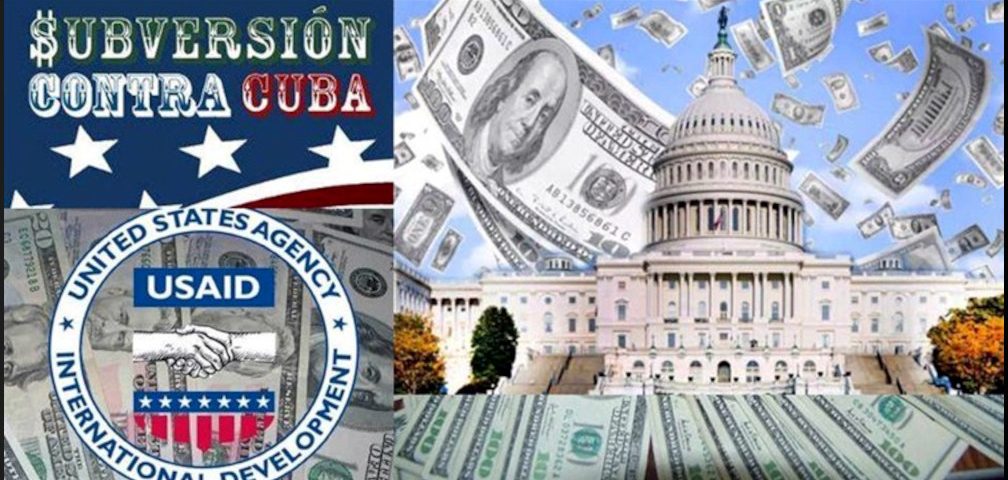By Alejandra Garcia, published on Resumen English, March 3, 2021
Of the never-ending list of U.S. measures against Cuba, much is said about the six-decade economic blockade. However, less attention is paid to the former U.S. President Donald Trump’s decision to maintain the program that has allocated over $250 million in the last twenty years to covert subversion operations against the island.
On March 2, during a Zoom meeting called by Code Pink, the women-led organization working to end U.S. wars and militarism, the Cuban attorney and political analyst Jose Pertierra focused on what he called,
“one of the most disgusting components of the Helms-Burton Act: The Regime Change Section, also known by its euphemistic name of ‘Democracy Promoting Projects.’”
Pertierra cited an article written by former National Intelligence Officer for Latin America Fulton Armstrong in which he described these ‘Cuba programs’ as those that were designed to identify, organize, train, and mobilize Cuban citizens to demand a political change in the island. “Those programs have an especially problematic heritage, including embezzlement, mismanagement, and systemic politicization,” the lawyer said, quoting Armstrong.
“The funds of about $20 million a year are used effectively and in a manner consistent with U.S. law. The U.S. Agency for International Development (USAID) fought us at every turn, refusing to divulge even basic information about the programs, citing only a document of vague ‘program objectives’.” Armstrong wrote.
According to Pertierra, those millions of dollars have created an industry of dissidents in both Miami and Havana.
Using the proceeds of the regime change programs, Miami-based dissidents have established themselves in cushy offices and earn inflated salaries. Their job is to instigate dissent in Cuba.
A tiny fraction of those millions make it to Cuba. What does that money buy? Pertierra said “it is used to pay people to march and protest. It creates amateur journalists who are on the payroll of US regime change projects. And it rewards those who, pretending to be artists or performers, use social media to express their dissatisfaction with the government. One so-called artist sat on a toilet with a Cuban flag draped across his shoulders, as he defecated on Facebook Live.” This individual is now a cause celebre on social media, Pertierra explained.
There is no accountability for the millions of dollars that are being spent on regime change programs because they are clandestine and covert.
“Some in Congress would have you believe the President has no discretion in how to spend those millions of dollars. However, the Office of Management and Budget (OMB) decides how to use those funds. It can reprogram them, for example, to stimulate the Central American economies and thus dissuade potential immigrants from coming to this country. The White House could also ease the economic crisis caused by the pandemic and Trump’s mishandling of the health emergency,” the lawyer said.
“How would struggling Americans, who are facing possible eviction from their homes because they have lost their jobs in the midst of this pandemic, feel when they find out that their government is spending more than $20 million a year to pay Miami Cubans a salary to be professional dissidents against the Cuban government?” asked Pertierra.
The U.S. hostility is no news
For almost a century, “the successive administrations have created a tremendous hardship for the Cuban people. Trump just made it worse,” recalled Code Pink leaders during the Zoom meeting, as they regretted that President Joe Biden has not done anything to change the course of the relations between the two countries.
“How can we put pressure on the administration to take action via executive order?”
Code Pink asked Congressman Jim McGovern.
“We have a lot of work to do,” recognized McGovern.
“I’m frustrated because Biden could do a lot more than what he has already done. There are some decisions he could make that don’t need congressional approval. For example, re-opening up our embassy in Havana.”
McGovern has been traveling to Cuba for decades.
“In all these years, I never saw so much activity, excitement, creativity, innovation, in the Cuban people than during the last two years, after then-Presidents Obama and Raul Castro normalized relations in 2017. That year, Obama did what we had wanted the U.S. to do a long time earlier,” he explained.
Many people took advantage of those changes building stronger partnerships, collaborating with small businesses and artists, joining researches and studies, strengthening local farmers, urging U.S. people to explore Cuba’s opportunities and beauty.
“The possibilities seemed endless” –McGovern said– “until Trump came along to show us that everything could be worse than it once was. We realized that all could be undone, that the U.S. could go back to Cold War ideology.”
When asked to comment on Pertierra´s argument that the $20 million a year in regime change funds for Cuban dissidents could be reprogrammed to attend to the needs of the American people, Congressman McGovern agreed that it was something that should be done.
The U.S. must turn the page, said the Congressman. Trump is no longer president, and those who want to re-establish relations with Cuba are writing a new chapter. Now, with a new administration, “we have another chance to create a better future for both of our countries,” he said.
This is possible, Jose Pertierra added.
“We just need to answer the following questions: What danger does Cuba really pose to the U.S.? Has Cuba ever tried to storm the Capitol? Have they spread lies about a presidential election? Or encouraged American citizens not to wear masks in the middle of a pandemic that has killed over half a million U.S. citizens?”
Cuba poses no threat to the United States, and everyone knows it. Now they need to act on that knowledge.
